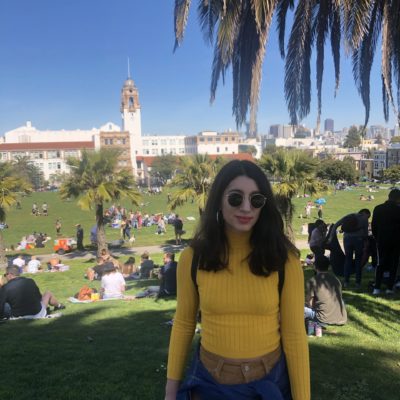Provocative Listenings: Andrew McEwan on Hannah Weiner’s “selvesothers”
April 23, 2021
Emma Telaro


When I think of Hannah Weiner’s Clairvoyant Journal, I think of the daily, but also of something impenetrable and stirring, of a visible if opaque unfurling of words on the page and in the air. The text is out there, moving, and this motion is perhaps best apprehended when performed. I was excited to talk with Andrew McEwan, whose research on Weiner’s performance of Clairvoyant Journal speaks to these very textual and aural qualities of the work. After speaking with Andrew, I returned to Weiner, listening for what he—provocatively, to use his own terms—theorizes as her “selvesothers.” I invite you to do the same and to reflect on how it might shift your reading.
For your conference paper, you suggest an analysis of poet Hannah Weiner’s recorded performance of Clairvoyant Journal from the cable poetry show “Public Access Poetry” (1977-1978). Could you tell us about this performance, and about Clairvoyant Journal?
Hannah Weiner’s performance on “Public Access Poetry” caught my attention right away, once I began looking at her work, since it is such an interdependent poetry performance. “Public Access Poetry” was a cable TV show broadcast in New York for two seasons. It recorded half hour performances of poets and made their work public it in a remarkable way. I found out about it while researching Weiner on the invaluable PennSound page, which has digitized and preserved these performances.
The text Weiner reads on “Public Access Poetry,” Clairvoyant Journal, is a poetic object I’ve been interested in long before I decided to focus on Weiner as part of my thesis. The book is part of what Weiner described as her “clair” writing, which is based on her perceptual experience of seeing text and hearing voices that others do not. As per the title of the collection, Weiner describes these experiences as “clairvoyance,” in opposition to the medicalization and pathologization of this way of being. The journals and other “clair” books take the form of a kind of reporting on her experience of words interrupting her stream of thoughts and visual perceptions, and she uses different typographical methods to indicate which of the voices she attributes these interruptions to. At the opening of the book, she writes:
I SEE words on my forehead IN THE AIR
on other people
on the typewriter on
the page These words appear in the text in
CAPITALS or Italics.
The words in lower-case Weiner attributes to herself, whereas the capitalized and italicized words are attributed to two distinct other voices. Beyond the experience of clairvoyance, the journals elaborate the daily life of a poet and performer, as well as the struggles of managing the effects of non-normative mental embodiment on a daily basis. Further, the work employs novel typographical and formal innovations to convey the experience.
A digitized copy of the original typesetting is available on the eclipse archive.
.
When reading your proposal, I was struck by this idea of “selvesothers.” What is, or are, Weiner’s “selvesothers”? How do they generate the text, or how do you understand “selvesothers” as Weiner’s poetic concept?
In my ongoing work, I characterize Weiner’s experience of voices and words that she expresses as having distinct personas as “selvesothers.” Weiner introduces this neologism in her first “clair style” book, The Fast. She describes a developing understanding of her experience as an engagement with “selvesothers.” Although Weiner doesn’t continue to utilize this term in subsequent works, or apply it specifically to Clairvoyant Journal, I find the concept of “selvesothers” usefully describes the relation between Weiner’s “own” voice and the linguistic voices other to her sense of self and voice, yet particular to her experience and constitutive of her subjectivity. The word describes the blurred distinction between self and perceived others specific to one’s own perceptual experience. Further, these “selvesothers” create a self-reflexive alienation from her own voice. Weiner writes: “clairvoyantly I am the other to myself.” This flex between singular and multiple is a point I am developing in my PhD dissertation, since it provides a way to read Weiner’s poetic disruption of liberal humanist singularity and supposed independence, while also resisting a generalization of non-normative mental embodiment that would obliterate the specifics of socially-disabled experiences of difference. My work is based in Madness theory and critical Disability theory, and although the terms of Mad and Disability activism and subjectivity weren’t something Weiner engaged in (possibly because they weren’t fully accessible in her lifetime), her work speaks to a state of pathologized difference and social stigmatization, which had disabling effects. Her poetry claims this experience as valuable and up to self-determination, much as Mad and Disability theory and activism advocate for. Thus, “others” specific to the “self,” who are constitutive of the self’s experience of themself, become a great way to develop this line of thinking.
You speak of the performance of Clairvoyant Journal as a social exercise and listening experience that encourages community, plurality and multivocality. And, notably, you’re working towards a PhD dissertation on poetic resistance to mental ableism. Could you talk more about this significant research, and about how your talk fits in with this larger project?
As with my discussion of “selvesothers,” I feel that Weiner’s work is specifically engaged in reconfiguring the terms of individual subjectivity and voice. Her work becomes, itself, a kind of community insofar as it includes three distinct voices. This first level of community I see as a kind of self-multiplicity–or the self as interdependent community. Next, her work is very engaged with her social community, and the journals are full of names of writers, artists, spiritual guides, and friends, and thus show the social community as intrinsically constitutive of individual experience. I feel that if we look at the performance of Clairvoyant Journal on “Public Access Poetry,” we see this relation between self and community in an interesting way. Weiner has two performers read the parts of the capitalized and italicized voices, while Weiner reads the words she associates with her own voice. In her introduction to the performance, she introduces it as follows: “The big words are shouted by Sharon Mattlin, and the little words, which sometimes make nasty comments… are read by Margaret DeCoursey. I read myself.” Here, again, is the interesting way Weiner creates a flex between the voice of self and the voice of her perceived others. All three of these voices are part of her own specific experience and constitutive of her perception of herself, yet within this is a space for her own voice. In performing her multi-vocal individual experience, though, Weiner must rely on the embodiments of other performers to stand in for these perceived “selvesothers.”
I find this reliance on community to perform a specific experience of the self very provocative. Disability theory has long been interested in critiquing the ways in which independence is valourized, whereas interdependence is condemned in ableist society, and focuses instead on how all individuals are reliant on interdependent relations to survive and thrive, but that some forms of interdependence are stigmatized and socially disabled. The implicit critique of mental ableist norms that I read in Weiner’s texts and performances relates to my larger research project which considers mentally disabled experiences and poetics that are based in such experiences. I see in a number of works an interplay between stigmatized mental experience and avant-garde poetics; the flexibility of avant-gardism allows space to initiate experiences of mental embodiment typically disallowed through social and medical pathologization.
Hannah Weiner on “Public Access Poetry”:
What other things have you been researching and listening to lately?
Lately I’ve been researching another poet I’m writing on in my dissertation, Claude Gauvreau. As such, I’m looking at his performances of his texts. Gauvreau uses novel words he describes as “exploréen” images, which are anything from slight misspellings of French words, to combinations of words in neologisms, to strings of letters that are clearly meant to produce a solely auditory effect. As a non-native French reader, I rely on recordings for clues in how Gauvreau uses such words. I’ve also found excerpts from a musical setting of some of Gauvreau’s poems from his collection Poèmes de détention and would love to find a complete recording.
Outside of poetic recordings, my listening is largely focused on music: hardcore, punk, and metal music (Sect, Modern Life is War, Tørsö, Dawn Ray’d, Venom Prison, and Feminazgul lately), as well as more experimental music (Lingua Ignota, Brambles, and Backxwash).
Andrew McEwan is a PhD candidate at Brock University who writes on Disability, Madness, and literature. His recent work can be found in the anthology Literatures of Madness, and the poetry collection If Pressed.
This article is published as part of the Listening, Sound, Agency Forum which presents profiles, interviews, and other materials featuring the research and interests of future participants in the 2021 SpokenWeb symposium. This series of articles provides a space for dialogical and multimedia exchange on topics from the fields of literature and sound studies, and serves as a prelude to the live conference.
